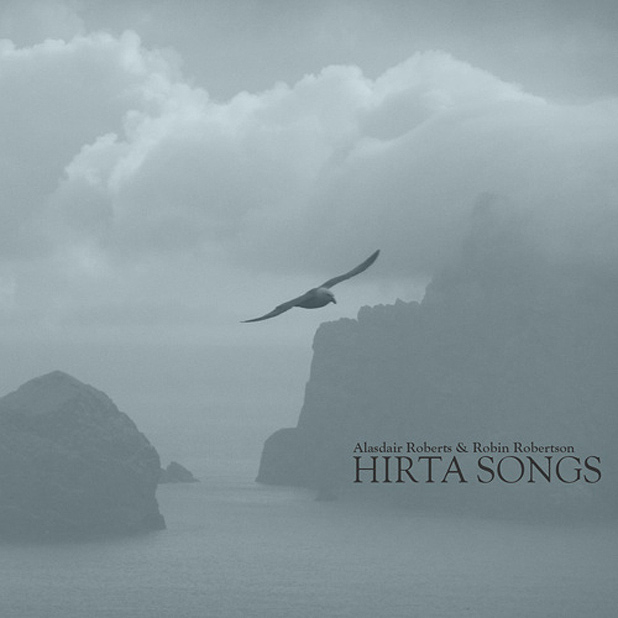While Alasdair Roberts’ output over the years has been steady, consistent and of the highest quality, prolificness is not something one particularly associates with him. Therefore, two albums in one year is unusual for this most thoughtful and studious of artists. Hirta Songs, a followup to January’s A Wonder Working Stone, is a beautiful collaboration between two genuinely complementary, soulful and soft-natured talents; on Hirta Songs, Roberts delivers music and vocals for words composed by major Scottish poet Robin Robertson.
This project makes for a stark contrast with A Wonder Working Stone, a record designed to encapsulate everything, including culture, history, myth, science and more, reflecting Roberts’ polymathic tendencies. Instrumentally, it was ambitious and complex, a multi-layered modern folk opus that appeared to have been long in its gestation.
Hirta Songs is rather the opposite. It is specific; its focus narrow and its expression particular. The subject is the remote Hebridean island group of St Kilda, which sits isolated over 40 miles from North Uist – Hirta being the largest of St Kilda’s islands. Robertson, the initiator of the project, chose wisely in working with Roberts – St Kilda’s intriguingly charismatic history is firmly up his alley. It was abandoned in 1930 by its few remaining residents due to illness, lack of crops and other factors, creating an eerie and condemned landscape that became both a military base and a source of plenty of artistic interpretation. Roberts and Robertson are the latest in a line that includes Hammond Innes, Runrig and the Scottish government’s opera, St Kilda – A European Opera. Robertson’s wife has written a novel set on the islands.
In the hands of these two, St Kilda retains its mystery, yet the physical hardship associated with the place is also emphasised. Its nature (birdlife in particular) is in the foreground too, and
Robertson’s dramatic narratives are sincere and direct. Though St Kilda’s residents were Gaelic speakers, these songs are sung in English, with Robertson’s intention not just accessibility, but to
accommodate his wider poetic influences into the album – as well as Robert Burns, general Celtic myth, and Britons such as Ted Hughes, Robertson also has a turn of phrase akin to Robert Frost at times, while another major influence is Robert Lowell. The overall effect of this, in combination with the bleak landscape in question, is something approaching a Hebridean Edgar Allen Poe. Two tracks here, ‘Leaving St Kilda’ and ‘The Well of Youth’ are Robertson reciting over instrumental tracks from harpist Corinna Hewat, the former being a hugely evocative piece about the rock itself, the latter a more tragic meditation on childhood and death. Both are quite mesmeric.
The rest of Robertson’s lyrics are in the hands of Roberts. His accent, always thick, is yet more elegant when wrapped around Robertson’s words. His melodies too, are as transporting as ever, deriving deliberate cues from Gaelic tradition (‘Plain of Spells’ taking its melody from the well-known ‘Mor a’Cheannaich’; ‘A Fall of Sleet’ from ‘The Battle of Inverlochy’). At various points, however, Roberts’ own innate mastery of songwriting shines through. One of Hirta Songs‘ finest moments must be ‘The White-handled Knife’, which features a number of Roberts’ signature melodic turns – as in fact does ‘A Fall of Sleet’, a track that supremely merges Roberts’ individuality with that traditional structure.
Despite this being an album of poetry, it is somehow a less wordy collection than A Wonder Working Stone, which seems ranting by comparison. The music too is less busy and frenetic. These austere arrangements are defined by Rafe Fitzpatrick’s fiddle and more so, Hewart’s magnificently delicate harp. Rarely for an Alasdair Roberts album, one is not dazzled by the unusual guitar tunings and changing rhythms – the simplicity of the music lends more weight to Robertson’s verse.
Another illustrious Scot involved with Hirta Songs is Robin Williamson, once of the Incredible String Band. Here, he plays hardanger fiddle on a mere two tracks, yet he must stand as a significant influence over the whole thing, thanks to his UK tours of storytelling and traditional music in recent years. His involvement in what is a consummate example of this fine art is another adornment on a fascinating, often astonishing, work.


